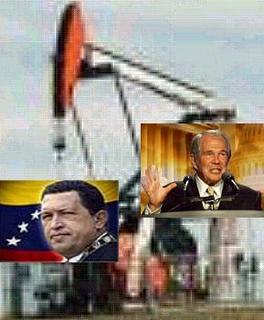Article in local paper:

Chaves is a threat to U.S. economis interests
In recent weeks, the heretofore little known Venezuelan President, Hugo Chavez has suddenly been thrust into the western media spotlight. The genesus for this newfound notoriety was U.S. Televangelist Pat Roberstson publicly calling for Chavez's assasintation.
Normally one does not expect a man of the cloth to advocate murder. But Robertson explained the threat posed by Venezuelan regime needs to be removed, and the U.S. can ill afford another $200.00-billion dollar war.
Although Robertson and his moral majority Christian constituency are considered to be staunch Bush allies, those in the Whitehouse quickly distanced themselves from the suggested assasination.
In an Ironic understatement, U.S. Secretary of Defence Donald Rumsfeld-the architect of the Iraq invasion and its failed leadership strikes against Saddam-told journalists that killing world leaders is "illegal" and could not be condoned by American policy makers. However, with the publicity surrounding Robertson's personal "fatwa" has brought to light just how troublesome Hugo Chavez has become to U.S. interests.
Unlike Saddam Hussein, the Venezuelan president is not rumoured to be stockpiling weapons of mass destruction and although Chavez himself is a former paratrooper Colonel, Venezuela cannot be considered even a regional military threat.What makes Chavez dangerous is his knowledge of the American market's dependency on oil imports,and the fact that he controls the world's fifth largest supply. while that alone doesn't make Venezuela much of a threat, the pesky little Chavez has long been a very active member of OPEC, and has been aggresively pushing for changes in the oil trade that would deeply impact the U.S. economy.
For instance, in August 2000, Chavez was the interim president of OPEC and he flagrantly violated the U.S.-imposed post Gulf War trade sanctions by flying into Iraq. At a little publicized Baghdad summit, Chavez formally brought Saddam back into the oil-exporting community. More importantly, it was at this meeting the two leaders plotted to convert their future oil sales from U.S. dollars to the Euro currency as soon as possible.If all other OPEC nations followed suit,they predicted there would be a massive devaluation of the American dollar.
All industrialized oil importing countries must currently stockpile U.S. currency and it is therefore in everyone's best interest to keep the U.S.dollar strong and the oil prices low.
However, if those essential purchases have to be make in Euros instead, there would be an immediate global scramble to dump those stockpiles of greenbacks. even the U.S. would need to convert signifigant sums into Euros in order to meet their requirements. With the vastly over-extended U.S. treasury securing less than one-tenth of one per cent of their internationally circulated currency with gold reserves, such a move would be devastating to the American economy.
Two month's prior to the March 2003 invasion Saddam Hussein did in fact convert his oil exports to Euros. While this move went virtually unnoticed in the pre-war media coverage, it is worth noting that since the minute U.S. soldiers secured Iraq'a oil fields, all subsequent exports have been in good old American dollars.
Now, with the price of oil hovering around $70.00 per barrel, Chavez has once again been taunting the U.S. administration.
Given this huge increase in national revenues, the Venezualan president has been spending on his less fortunate Latin American neighbours. With the equator facing an interruption o it's own oil production due to violent domestic protests, Chavez has stepped in to cover their shortfall without financal loss.
After a summit with Fidel Castro, the Venezuelan president also signed a deal to supply Cuba with $1.7 billion worth of cost free oil.(note: this amounts to more financial aid than the U.S. spends annually on ALL of Latin America). Additionally, Chavez has invested in a new $2.5 billion Brazillian oil refinery, pumped an undisclosed amount of capitol into Uruguay's struggling national airline, and the list goes on.
In the U.S. media, Chavez's populist movement and his recent pan-Latin American initiatives are considered to be a threat to American's future economic interests in the region. One analyst stated that Venezuela's present policy of despensing profits made "no financial sense" and therefore only could be considered a "political investment to empower Chavez"
It is a disturbing comment on American capitolistic values when such charitable initiatives are viewed as "threatening" to their national interests, and Christian leaders see assassintation as the only appropriate response.
by-line:
Scott Taylor is the Editor of Esprit De Corps magazine and a member of the Osprey writers group. Author of several best-selling books, including Spinning On The Axis of Evil : America's War against Iraq.
Comments